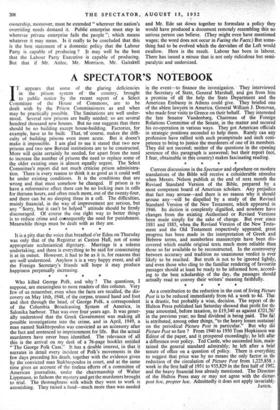Current discussions in the Spectator and esewhere on modern translations
of the Bible will receive a considerable stimulus when Messrs. Nelson publish at the end of next month the Revised Standard Version of the Bible, prepared by a most competent board of American scholars. Any prejudice that fact may arouse—and there is no reason why it should arouse any—will be dispelled by a study of the Revised Standard Version of the New Testament, which appeared in 1946. Its diction is completely dignified, and nowhere have changes from the existing Authorised or Revised Versions been made simply for the sake of change. But ever since 1881 and 1885, when the Revised Version of the New Testa- ment and the Old Testament respectively appeared, great progress has been made in the interpretation of Greek and Hebrew terms, and numberless manuscripts have been dis- covered which enable original texts much more reliable than those so far available to be reconstructed. In the controversy between accuracy and tradition no unanimous verdict is ever likely to be reached. But truth is not to be ignored lightly, and even those who cling to the familiar rendering of favourite passages should at least be ready to be informed how, accord- ing to the best scholarship of the day, the passages should actually read to convey their writers' meaning faithfully.


























 Previous page
Previous page